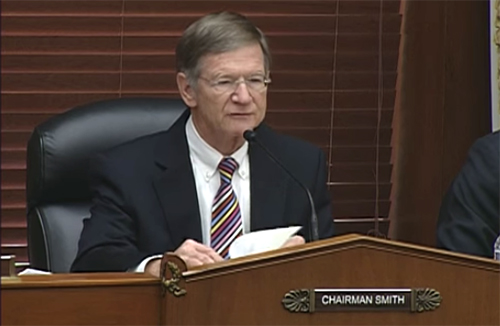American politicians’ war on climate science

I warned scientists in Washington DC last week that climate researchers need to repel the attacks being launched against them by President Trump’s administration and the Republican Party.
The annual policy forum organised by the American Association for the Advancement Science heard frank assessments from both inside and outside the United States about the role of climate researchers in producing and defending evidence.
Two climate experts, Dr Amy Luers and Dr Kirstin Dow, drew on their experience of policy-making to identify constructive ways of attempting to engage the federal government and its agencies about the risks of climate change.
I presented a British perspective, calling for American scientists to resist cuts in federal funding for climate research in the United States which would damage policy-making around the world.
They should put their case forward, forcefully, by engaging with policy-makers, both directly and through expert bodies such as the National Academy of Sciences, and to challenge misinformation in the media.
And they should join other scientists to make their voices heard by marching in Washington and around the country on 22 April.
In January, I helped to organise a letter to the Prime Minister, Theresa May, from 100 members of the UK climate change research community, which highlighted ahead of his inauguration the potential risks and opportunities posed by Donald Trump’s presidency.
The letter stated: “We stand ready to support and assist our counterparts in the United States, as collaborators, co-authors and colleagues, in resisting any political attempts to prevent, hamper or interfere with vital research on climate change.”
Two months on, many of the threats we highlighted have started to become realities.
President Trump signed an Executive Order last week which attempted to reverse the progress achieved by President Obama in promoting domestic action against climate change.
The Order included a review of the Clean Power Plan, which was initiated by President Obama to accelerate the phase out of coal-fired power plants.
Mr Trump pledged during his election campaign to kill off the Plan. However, his administration is bound by law to take some action against carbon dioxide emissions.
The most recent analysis by the United States Energy Information Administration indicates that annual carbon dioxide emissions from the United States are likely to be higher without the Plan.
The assault on President Obama’s climate policies is backed by Scott Pruitt, the new head of the Environmental Protection Agency.
Mr Pruitt has been a vocal critic of the Agency and launched 14 lawsuits against it in his previous job as Attorney General of Oklahoma.
Since taking on his new role, Mr Pruitt has declared that human activity is not “a primary contributor to the global warming that we see”.
The attack on the Clean Power Plan follows the shocking reductions in funding for climate monitoring and research proposed in President Trump’s 2018 budget blueprint.
As well as halving research money for the Environmental Protection Agency, it would end support for four NASA missions to monitor the Earth’s climate.
One of these missions is already operational, with the Deep Space Climate Observatory (DSCOVR) satellite having been launched in February 2015.
But the budget proposes to stop money being spent on the “DSCOVR Earth-viewing instruments”, while continuing support for the instruments directed towards space.
It also takes money away from a satellite programme created by the National Oceanic and Atmospheric Administration (NOAA) to provide better information about polar climates.
The budget blueprint is likely to face stiff opposition from many members of Congress because it slashes funding for many other areas of science in addition to climate research.
Addressing the science policy forum last week, Democrat Senator Chris Coons described the budget cuts as “ideological and nonsensical”.
But other members of Congress have enthusiastically joined forces with the Trump administrations in the war on climate scientists.
Also last week, the House of Representatives Committee on Science, Space and Technology held a hearing as part of its Chairman’s long campaign against climate researchers.
Republican Lamar Smith has been carrying out a campaign against NOAA since some of its scientists published a new analysis in June 2015 suggesting that there had been no ‘pause’ in global warming at the start of this century.
Although NOAA has provided Mr Smith with the data used in the study, it has refused to agree to his demands to hand over all of the scientists’ emails.
But Mr Smith has stepped up his campaign following the publication of an inaccurate and misleading article by ‘The Mail on Sunday’ in February, which alleged that the research was flawed.
However, it soon became apparent that the newspaper’s report had grossly exaggerated the claims of a disgruntled former NOAA employee.
The article is now the subject of an official complaint by me to the Independent Press Standards Organisation on the grounds that it contained 30 false claims.
Mr Smith told a meeting of climate change ‘sceptics’ in Washington last month that the hearing on 29 March was “going to be so much fun”, according to a reporter for the journal ‘Science’.
We know that Mr Smith is not alone in Washington in wanting to stop federally-funded climate research and data collection.
But attempts to stop scientists from revealing the real consequences of greenhouse gas emissions will not eliminate the risks to millions of Americans from climate change impacts.
Bob Ward is policy and communications director at the Grantham Research Institute on Climate Change and the Environment at the London School of Economics and Political Science.

